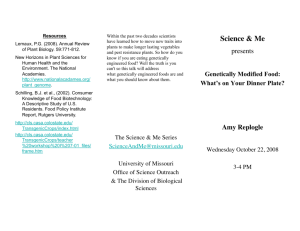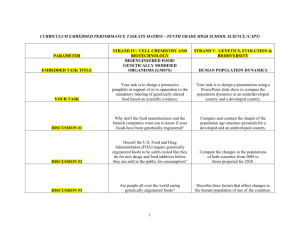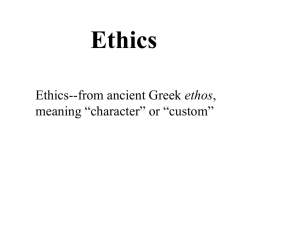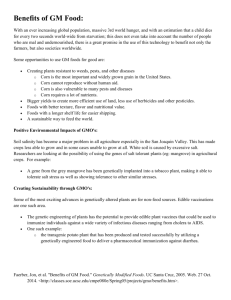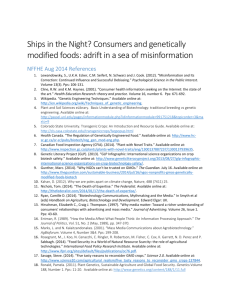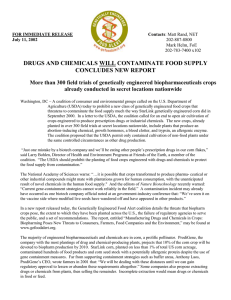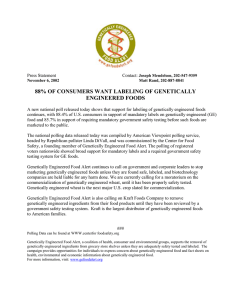January 13, 2003 Ambassador Tony Hall
advertisement
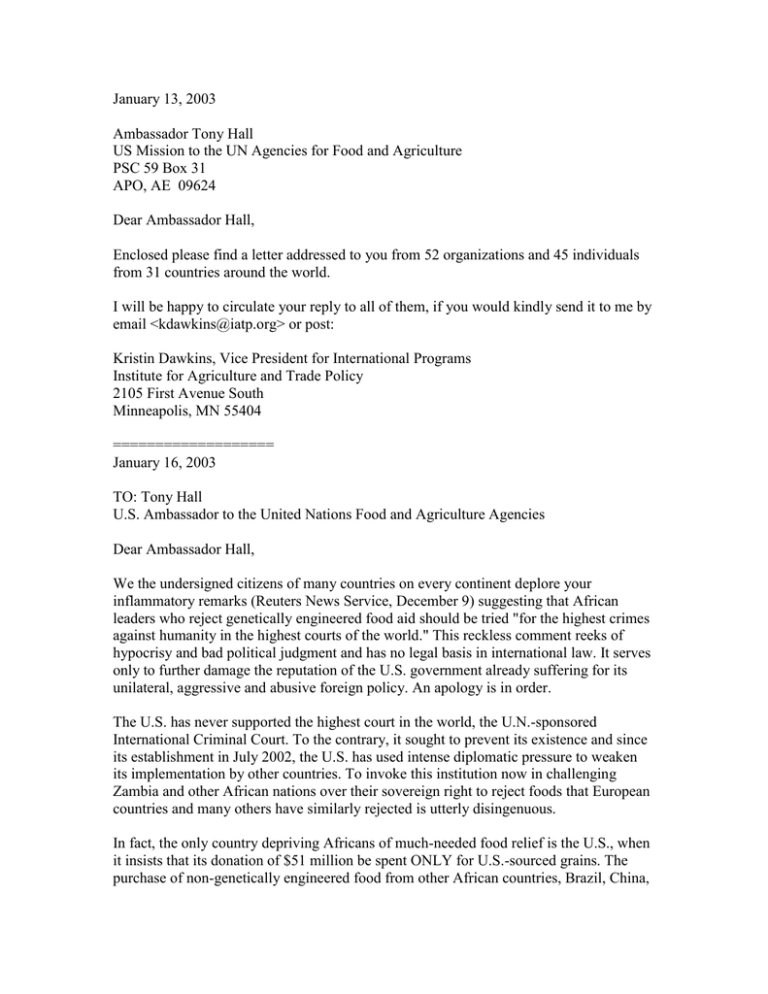
January 13, 2003 Ambassador Tony Hall US Mission to the UN Agencies for Food and Agriculture PSC 59 Box 31 APO, AE 09624 Dear Ambassador Hall, Enclosed please find a letter addressed to you from 52 organizations and 45 individuals from 31 countries around the world. I will be happy to circulate your reply to all of them, if you would kindly send it to me by email <kdawkins@iatp.org> or post: Kristin Dawkins, Vice President for International Programs Institute for Agriculture and Trade Policy 2105 First Avenue South Minneapolis, MN 55404 =================== January 16, 2003 TO: Tony Hall U.S. Ambassador to the United Nations Food and Agriculture Agencies Dear Ambassador Hall, We the undersigned citizens of many countries on every continent deplore your inflammatory remarks (Reuters News Service, December 9) suggesting that African leaders who reject genetically engineered food aid should be tried "for the highest crimes against humanity in the highest courts of the world." This reckless comment reeks of hypocrisy and bad political judgment and has no legal basis in international law. It serves only to further damage the reputation of the U.S. government already suffering for its unilateral, aggressive and abusive foreign policy. An apology is in order. The U.S. has never supported the highest court in the world, the U.N.-sponsored International Criminal Court. To the contrary, it sought to prevent its existence and since its establishment in July 2002, the U.S. has used intense diplomatic pressure to weaken its implementation by other countries. To invoke this institution now in challenging Zambia and other African nations over their sovereign right to reject foods that European countries and many others have similarly rejected is utterly disingenuous. In fact, the only country depriving Africans of much-needed food relief is the U.S., when it insists that its donation of $51 million be spent ONLY for U.S.-sourced grains. The purchase of non-genetically engineered food from other African countries, Brazil, China, Hungary, Russia and other regions as yet free of genetic contamination would readily alleviate the impending famines and at the same time stimulate agricultural productivity and economic development in these regions. In fact, some 70% of all corn produced in the U.S. is still not genetically engineered - so you could even procure what the Africans prefer from the U.S.'s own farmers, if that were the objective. You criticize African leaders for protecting their people, while our government sends food aid containing StarLinkTM, a variety of genetically engineered corn that the U.S. Food and Drug Administration has not approved for human consumption in this country. Perhaps the U.S. should be tried for this crime against humanity. Why should Zambians be expected to eat food that Americans, Europeans and others will not? Why should any people be expected to eat food that has not been adequately tested by the manufacturers or the U.S. government for safety in humans, especially if this untested food will comprise two-thirds of their daily caloric intake? Why should Zambians ingest genetically engineered corn that may affect the stomach lining and cause allergies, and contains an antibiotic-resistant gene - when their immune systems are already weakened by malnutrition? Your crude remarks seem intended to divert attention from a far more troubling issue: the political reasons that the U.S. government is foisting genetically modified corn on people in need around the world, not just in drought-stricken Africa, when supplies of conventional grain are available. The U.S. has a corn surplus here, because genetically engineered foods are rejected in many commercial markets. Do you also propose that the leaders of these countries be tried for high crimes against the U.S.? A cynical food aid strategy that dumps unsaleable corn in vulnerable communities relieves the U.S. of these burdensome stocks while giving Monsanto and other biotechnology companies a boost by destroying competing sources of non-genetically engineered grains from the world marketplace. Mr. Hall, you have sacrificed a fine reputation as an advocate for the hungry to serve Monsanto and the rest of the biotechnology industry that has captured the voice of the Bush Administration's White House. Zambian President Levy Patrick Mwanawasa invoked the sovereign rights of governments to protect their citizens. He said that foods untested for human consumption posed "a danger to the lives of citizens" and that the import represented an immediate possible threat of "contaminating local indigenous and hybrid seed stocks" needed to reconstruct the region's agricultural capacity and food security. His view is shared by more than 100 other governments around the world that have signed the Cartagena Protocol on Biosafety and the Convention on Biological Diversity – both international treaties negotiated under auspices of the United Nations. It is also shared by those of us signing this letter below on behalf of 52 organizations and 45 individuals from 31 countries. Are we also to be tried for high crimes? Sincerely, ON BEHALF OF THE ATTACHED SIGNATORIES Cc: U.S. Secretary of State Colin Powell U.S. Undersecretary of State Alan Larson U.S. Agency for International Development Administrator Andrew Natios U.N. Food and Agriculture Organization Director-General Jacques Diouf U.N. High Commissioner for Human Rights Jaime Mello Viera U.N. High Commissioner's Office Special Advisor on Food Jean Ziegler ================================= Note: Affiliations following an individual's name do not necessarily imply organizational endorsement. Australia Australian Greens GE-Free Bathurst Bangladesh Zakir Md. Hossain, Krisok Krisoker Saar (Farmers' Voice) Shaila Shahid, Krisok Krisoker Saar (Farmers' Voice) Brazil AS-PTA (Assistance and Services to Project on Alternative Agriculture) Karla Matos Canada Jean Arnold Kelly Senkiw Denmark Jan Holm Ingemann, PhD., Head of Department, Agricultural Economics, Aalborg University Ecuador Pedro de la Cruz, President, FENOCIN France Anne-Marie Kibongui, Editions Cultures Croisées Germany Solidarische Welt e.V Gießen Alexandra Burmann Britta Steffenhagen, German League for Nature and Environment Hungary The ZHABA Collective India Sankalp Navbharat Sunray Harvesters Women's Centre, Bombay Indonesia Sintesa Foundation Italy AMAB-Associazione Mediterranea Agricoltura Biologica La Leva di Archimede (Association for Freedom of Choice) Ludo Goossens, cicm, Missionaries of Scheut Japan Food Policy Center Vision21 Kenya The Centre for Advocacy on Legal Ethics and Human Rights Issues (CALER) Latvia Green Liberty Mexico Areli Carreón , Red de Comunicación de Morelos Mozambique LIVANINGO Namibia Earthlife Namibia Netherlands Iza Kruszewska, ANPED W. de Lange, XminY Solidarityfunds Alexander de Roo, MEP Greens/EFA Jelle Schöttelndreier New Zealand GE Free New Zealand GE Free Northland Claire Bleakley, GE Free (Wairarapa) Nicaragua Centro de Información y Servicios de Asesoria en Salud Comité Regional de Promoción de Salud Comunitaria International People´s Health Council Philippines Ma. Elena Adre, FdCC, Canossian Sisters Sr. Estela Cordero, Justice Peace and Integrity of Creation Commission of the Canossian Sisters Spain Azucena González Coloma, Centro de Ciencias Medioambientales, CSIC CECU (Confederación de Consumidores y Usuarios) Sri Lanka Jerry Moles, NeoSynthesis Research Centre Theja Weeratne, Simple Wisdom South Africa Earthlife Africa Safe Food Coalition South African Freeze Alliance on Genetic Engineering (SAFeAGE) Swaziland Yonge Nawe Environmental Action Group Switzerland Bruno Gurtner , Senior Economist, Swiss Coalition of Development Organizations Florianne Koechlin, Blueridge-Institute United Kingdom The Gaia Trust Genetic Food Alert UK Scarborough Against Genetic Engineering Swindon Friends of the Earth Barbara Dinham, Director, Pesticide Action Network UK Matthew Mellen, The Gaia Foundation Jane Smith Tina Speck Bob Speck Marcus Williamson, Editor, Genetically Modified Food-News Uruguay ECOS Centro para el Desarrollo Sustentable USA Adrian Dominican Sisters Africa Faith and Justice Network Anarchist Action of Rochester Community Nutrition Institute Council for Responsible Genetics Family Farm Defenders Food First/Institute for Food and Development Policy Foundation on Economic Trends Institute for Agriculture and Trade Policy Morton County Citizens for Responsible Government, NW Resistance Against Genetic Engineering Organic Consumers Association Pesticide Action Network North America People's Education for a Sustainable Future Religious Center on Biotechnology, Inc. Rochester Food Not Bombs Washington Biotechnology Action Council Wisconsin Fair Trade Campaign Catherine Arata, SHALOM- The International Network for Justice, Peace, Integrity of Creation of the School Sisters of Notre Dame Rev. James P. Brobst, OMI, Director, Oblate house of Theology Jonathan Frieman, JoMiJo Foundation Mary Ellen Gondeck, Sisters of St. Joseph Office of Peace and Justice Ethel Fraga John Hagelin, Director, Institute of Science, Technology and Public Policy Martha Honey, Co-Director, Foreign Policy in Focus David C. Korten, People-Centered Development Forum A.V.Krebs, Corporate Agribusiness Research Project The Rev. Dr. Wallace Ryan Kuroiwa, United Church of Christ USA James Love, Director, Consumer Project on Technology Gar Smith, Editor, The-Edge, Earth Island Institute Laura Ticciati, Executive Director, Mothers for Natural Law Zambia Green Living Movement Dr. Mbololwa Mbikusita-Lewanika Bonaventure Mpasa, Delegate General for Justce and Peace and the Safeguarding of Creation (JPSC) for the Conventual Franciscan Friars (OFMConv) Father Darrell Rupiper, OMI (Missionary Oblates of Mary Immaculate) International 49th Parallel Biotechnology Consortium (US-Canada) Anti-Globalisation Network (UK and international)
